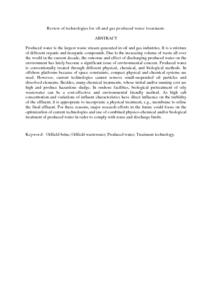Citation
Ahmadun, Fakhru'l-Razi and Pendashteh, Alireza and Abdullah, Luqman Chuah and Awang Biak, Dayang Radiah and Madaeni, Sayed Siavash and Zainal Abidin, Zurina
(2009)
Review of technologies for oil and gas produced water treatment.
Journal of Hazardous Materials, 170 (2-3).
pp. 530-551.
ISSN 0304-3894
Abstract
Produced water is the largest waste stream generated in oil and gas industries. It is a mixture of different organic and inorganic compounds. Due to the increasing volume of waste all over the world in the current decade, the outcome and effect of discharging produced water on the environment has lately become a significant issue of environmental concern. Produced water is conventionally treated through different physical, chemical, and biological methods. In offshore platforms because of space constraints, compact physical and chemical systems are used. However, current technologies cannot remove small-suspended oil particles and dissolved elements. Besides, many chemical treatments, whose initial and/or running cost are high and produce hazardous sludge. In onshore facilities, biological pretreatment of oily wastewater can be a cost-effective and environmental friendly method. As high salt concentration and variations of influent characteristics have direct influence on the turbidity of the effluent, it is appropriate to incorporate a physical treatment, e.g., membrane to refine the final effluent. For these reasons, major research efforts in the future could focus on the optimization of current technologies and use of combined physico-chemical and/or biological treatment of produced water in order to comply with reuse and discharge limits.
Download File
![[img]](http://psasir.upm.edu.my/16567/1.hassmallThumbnailVersion/Review%20of%20technologies%20for%20oil%20and%20gas%20produced%20water%20treatment.pdf)  Preview |
|
PDF (Abstract)
Review of technologies for oil and gas produced water treatment.pdf
Download (85kB)
| Preview
|
|
Additional Metadata
Actions (login required)
 |
View Item |

